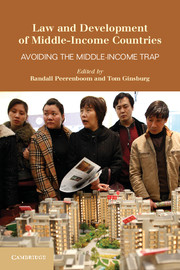Book contents
- Frontmatter
- Contents
- List of Contributors
- Acknowledgments
- 1 Law and Development in Middle-Income Countries
- Part I The Politics of Development in Middle-Income Countries
- Part II Middle-Income Countries in a Globalized Economy
- Part III Good Governance and the Rule of Law in Middle-Income Countries
- Part IV Socioeconomic Challenges in Middle-Income Countries
- 11 The Role of Courts and Constitutions in the New Politics of Welfare in Latin America
- 12 The Judicialization of Health Care
- 13 Nascent Protections in Emerging Giants
- 14 Environmental Challenges in Middle-Income Countries
- Part V International Donor Strategies for Middle-Income Countries
- Appendix Selected Country Data as of 2011
- Index
- References
11 - The Role of Courts and Constitutions in the New Politics of Welfare in Latin America
Published online by Cambridge University Press: 05 June 2014
- Frontmatter
- Contents
- List of Contributors
- Acknowledgments
- 1 Law and Development in Middle-Income Countries
- Part I The Politics of Development in Middle-Income Countries
- Part II Middle-Income Countries in a Globalized Economy
- Part III Good Governance and the Rule of Law in Middle-Income Countries
- Part IV Socioeconomic Challenges in Middle-Income Countries
- 11 The Role of Courts and Constitutions in the New Politics of Welfare in Latin America
- 12 The Judicialization of Health Care
- 13 Nascent Protections in Emerging Giants
- 14 Environmental Challenges in Middle-Income Countries
- Part V International Donor Strategies for Middle-Income Countries
- Appendix Selected Country Data as of 2011
- Index
- References
Summary
Like many middle-income countries (MICs), Latin American welfare states are squeezed between demands for basic social goods and neoliberal policy prescriptions backed by the pressures of a globalized economy. They are pressed to limit taxes, services, and the public sector in order to grow their economies by neoliberal lights; but they have sufficient resources to make the prospect of providing basic goods for their vulnerable populations more than a pipe dream. In MICs across the world, but perhaps especially in Latin America, social movements and reformers seeking ways to resist pressures to limit the welfare state have turned to economic and social rights (ESR) as a tool of mobilization. In alliance with courts, these advocates for ESR have sometimes been successful in tempering the harsher impulses of neoliberalism, and even in expanding and broadening the reach of public provision of goods like health care, housing, or water.
It is our suggestion that the politics of the welfare state in MICs are often shaped by the nature of this alliance between courts and ESR advocates. When courts take a more active role, they can become the central axis of debate, conflict, and cooperation among legislators, members of the executive, and social movements; when courts take a back seat, the debate remains more traditional, and social movements and their allies are generally weakened. Moreover, the forms that judicial “activism” may take also make a critical difference. Courts’ interventions can be more policy oriented, or less so; they can address individual grievances or systemic problems, and this too shapes how their intervention will affect politics. In many countries, courts have come to supply crucial deficits in the state, prodding inert central ministries into action; spotlighting large and small gaps in public policy; and lending political leverage and moral authority to ESR movements and advocates. In this way courts can compensate, in some measure, for deficits in responsiveness and accountability toward the mass of poor and vulnerable citizens on the part of bureaucrats, elected officials, and party elites, even under conditions of democratization.
- Type
- Chapter
- Information
- Law and Development of Middle-Income CountriesAvoiding the Middle-Income Trap, pp. 221 - 245Publisher: Cambridge University PressPrint publication year: 2014
References
- 9
- Cited by



